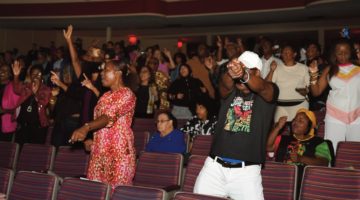 DORAL — In the fall of 1964, on the heels of the introduction of the landmark Civil Rights Act by President John F. Kennedy, African-American Air Force pilot Dave Harris turned in a job application to an airline company.
DORAL — In the fall of 1964, on the heels of the introduction of the landmark Civil Rights Act by President John F. Kennedy, African-American Air Force pilot Dave Harris turned in a job application to an airline company.
Though he recognized an opportunity to get a job as a commercial pilot, Harris did not know that he would later come to hold a pioneering position in United States’ commercial aviation history: He was the first African-American pilot for a commercial airline.
Harris was honored on Thursday, Aug. 14 at the Organization of Black Airline Pilots’ convention at the Doral Golf Resort & Spa.
He began his career as an Air Force pilot and, for six and a half years, flew some of the largest airplanes in the world at that time.
Though the experience was one of the best he had in his life, he said he soon became bored with working in the Air Force, and made the decision to become a commercial pilot after several of his white colleagues began discussing airline jobs.
He and his white colleagues at the time went to an airline one day, planning to get application forms. Everyone got the forms except Harris.
“Many people, in a time of segregation and separatist views, refused to hire me or interview me, and some refused to even begin the application process by giving me an application form,” Harris said.
After he was rejected by numerous airlines, he tried for American Airlines without knowing his chances of getting hired.
The airline hired Harris in its attempt to create a more diverse and inclusive airline industry. American was the first airline to publicly support Kennedy's “Plans for Progress” program that was designed to create equal employment opportunities.
But the white pilots training with Harris at the airline were not quite so progressive.
“You could see it in their body language. Some of them would turn their backs to you or not talk to you,” Harris said. “I had situations that I had to endure that were abusive. There was a white pilot who was a roommate with me and he would use the N-word repeatedly and say derogatory things about the maids [at the facility]. For me, out of the whole situation, that was the biggest detraction. It was lonesome for the most part because there were no others and it wasn’t until six months after I was hired that they got their second black pilot.”
Harris was born in 1934 in Columbus, Ohio, growing up in what he called “a typical town.” He attended a private school before going on to Ohio State University, where he studied for a Bachelor’s Degree in Education.
“Back then, I wanted to be physical education instructor or biological science teacher,” Harris said.
While attending Ohio State and enrolling in the Air Force’s R.O.T.C. (Reserve Officer Training Corps) program, a requirement for all male students in their freshman and sophomore years, Harris decided to continue the program after he had fulfilled his minimum mandatory two years of service.
The experience of the Air Force’s R.O.T.C. program changed his mind about a career in education and, after earning his degree, led him to pursue his newfound love of flying aircraft.
Harris said he thinks that the overall transition after the training period and the experience of the job as a pilot at American Airlines was positive. He said he went on to have what he calls, “the perfect career.”
He worked at the airline for 30 years, and, throughout that time, he gained seniority quickly as he went from being a new hire to co-pilot, then to captain, a role in which he began training other pilots.
He flew his last American Airlines flight on Nov. 30, 1994 and has retired to his home in Columbia, South Carolina.
American Airlines recently celebrated important moments in the history of the company and commercial aviation when they honored Harris and Joan Dorsey, who was the airline's first African-American flight attendant, at the American Airlines C.R. Smith Aviation Museum. The museum is dedicated solely to past and present American Airlines employees and American Airlines president C.R. Smith.
Cheryl Chew, executive director of the Organization of Black Airline Pilots, said, “Because American Airlines and American Eagle are our title sponsors, we thought that it was appropriate [to honor him] because he is the first African-American pilot with that particular airline. His honoring at what we call a pioneers breakfast was in conjunction with the honoring of all of the founders of the organization.”
Palmer.Shanique@Yahoo.com
Photo: Capt.Dave Harris












No Comment